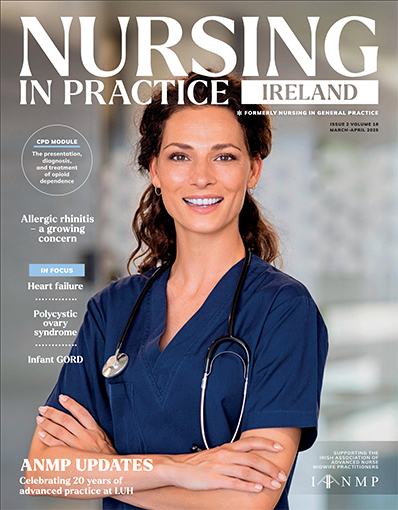An advanced nurse practitioner (ANP) is defined by the Nursing and Midwifery Board of Ireland (NMBI) as a nurse practising at a higher level of capability and as an independent, autonomous, and expert practitioner.1
A NMBI-registered ANP has to meet criteria to be accepted onto the advanced practice division of the register, regardless of whether they work in secondary care, specialist care, primary care, or general practice.
I have been working as an ANP in general practice for just over two years – and feel the most comfortable I have ever felt in my 20-year career. I would advocate for more ANPs in general practice as part of the primary care team, and I am sharing my story to encourage anyone that may be interested in pursuing this journey as part of their professional development.
A comprehensive foundation in nursing care provision
After qualifying with my degree from Queen’s University, Belfast, I started my nursing journey in cardiothoracic critical care in the Royal Victoria Hospital, Belfast. I moved to Dublin in 2009, where I worked in cardiology/coronary care and cardiothoracic intensive care, and also completed a higher diploma in critical care and cardiovascular nursing at Trinity College Dublin.
After completing my specialist postgraduate diploma, I decided to expand my knowledge base and moved to the intensive care unit (ICU) where I worked for a number of years. While in the ICU I was promoted to roles as clinical coordinator and clinical nurse manager.
In 2015, I made the decision to specialise further in the clinical side of nursing, rather than management, and moved into a clinical nurse specialist (CNS) role in cardiology/heart failure. I also began my Masters in Advanced Practice Nursing at University College Dublin. It was within this role that I completed 500 hours of advanced practice competencies in cardiology/heart failure nursing.
I took on different roles within this period, such as lead study coordinator for a large, international, multi-centred, randomised control trial for patients with heart failure, ensuring adherence with the Health Products Regulatory Authority’s strict guidelines and protocols.
In this role, I also helped to launch the virtual medical consultation clinics in heart failure, long before the pandemic, and provided a link between secondary specialists and general practice. This was a real eye opener for me about care in the community. I realised how isolated community care practitioners are in their practice and saw the gap in care between primary and secondary sectors. This experience inspired me to pursue an ANP role in general practice.
In 2018, I moved back to critical care and completed a further 500 hours of advanced practice in an acute care unit with high dependency, providing the hospital’s emergency first responders/acute life-threatening events recognition and treatment (ALERT) team and a critical care outreach team.
Here, I undertook a further 500 hours of competencies in advanced practice for critical care to add to my generalist portfolio, and built on my previous experience by moving from a specialist area to a more generalist role.
I mainly focused on competencies such as exacerbations of chronic and acute conditions, which include chronic obstructive pulmonary disease, asthma, diabetic emergencies, arrhythmias, and airway assessment and management. It was while working here that I read about the HSE Chronic Disease Management (CDM) Programmes in community care, and the concept of this programme greatly appealed to me.
I therefore contacted the NMBI to see if my current competencies could be transferred over to general practice, given I was considering moving into a role in the community. I also noticed that advanced practice roles within nursing in general practice were becoming more established.
I became familiar with Pathway 2 of advanced practice registration, which can be done through a developmental pathway. This means that the practitioner has completed a collection of courses that when combined meet the NMBI Advanced Practice (Nursing) standards and requirements.
Pathway 2 applications are then assessed to ensure that the standards and requirements are met. This meant that by recognition of services that span several patient groups and/or division(s) of the register, I needed to provide evidence of validated competencies relevant to the context of practice.
Making the move to general practice
In 2022, I moved to general practice with my advanced practice competencies as a registered ANP and continued to further enhance my learning experience. I now lead and enjoy my work with CDM. It is an ever-growing and always-learning role. The patient cohort and exposure can change over time, providing new opportunities to train and develop which reflect the dynamic nature of the role. Skills and competencies have to be adjusted in response to patient demand in an ongoing process.
This is the beauty of the advanced practice role, it can evolve and change according to your training, experience, and competencies. General practice ANPs (GPANPs) are generalists, like their general practice nurse (GPN) colleagues. Candidate ANPs keep their remit narrow, but with time, GP mentorship, and advanced clinical competencies, this scope can broaden to meet service needs.
My personal scope of practice and empirical knowledge have expanded significantly over the last two years, whereby I not only work with CDM and preventative medicine, but I am also now managing obesity weight management clinics, cardiovascular screening, and day-to-day acute care.
I also recently completed an ‘Optimising Nutrition’ course at University College Dublin and I have done multiple continuing professional development sessions on cardiometabolic chronic disease. I am also looking forward to commencing the ‘Nurse Authority to Refer for Radiology Procedures’ education programme at Trinity College Dublin in September of this year. After this, I hope to develop more skills regarding women’s health and menopause.
I love general practice, as every day is different, and I have learned to become more of generalist than a specialist. I am lucky to work alongside four great GPs who are forward-thinking and continuously support me to practise at the top of my licence.
Benefits of the ANP in general practice
International evidence supports the benefits that ANPs have on the overall health service due to their specialist knowledge, wide scope of qualifications, advanced competencies, and the ability to provide a full episode of care.2,3,4,5 Currently, there are approximately 1,000 ANPs in Ireland, with only 42 working in general practice settings. I believe that this number will steadily increase as more and more GPs experience and realise the benefits of the ANP.
In order to promote the advanced practice role, ANPs have come together to establish a new forum for anyone who is registered or is a candidate in advanced practice. We have now established the GPANP Ireland group, which aims to advocate for and support nurses within advanced practice roles, and raise awareness of the role within the general practice arena.
A GPANP is able to assess and examine patients; order and interpret many diagnostic investigations; treat and prescribe; and refer and access services for patients. Importantly, we are independent practitioners; are governed by our own regulatory body – the NMBI; and are fully indemnified to work at an advanced level once declared to insurance.
ANPs are on a separate register to a GPN. An ANP is enlisted in three divisions: Registered General Nurse (GPN with no prescribing); Registered Nurse Prescriber (GPN with prescribing); and ANP, which again allows for a scope of autonomy and accountability, along with advanced practice capability.
I decided to join the committee for the Irish Association of Advanced Nurse and Midwife Practitioners to promote the role of ANPs in general practice, particularly as there was no one to represent primary care on the committee at the time. More recently, I have been appointed Chairperson, and I think it is a great opportunity to bring primary and secondary advanced practitioners together.
This is also an excellent association for networking with key stakeholders such as the NMBI and the Department of Health (DoH); our Chief Nursing Officer; the Minister for Health; CEO of the HSE; and international associations such as the International Council of Nurses. I am looking forward to continuing to evolve and promote this new role in general practice.
Future outlook
Recently, the general practice section of the Irish Nurses and Midwives Organisation has become more active, with a mission to establish a voice for GPNs regarding our terms and conditions in comparison to public sector nurses. With the current healthcare drive to shift care into the community and deliver the Sláintecare policy, we need to look at modernising healthcare, to support our current workforce, and attract more nurses into the community.
Future investment into general practice nursing by the DoH would not only focus on 45 per cent of the general practice workforce, but also ensure retention of those looking for career progression, encourage interested GPNs towards education and upskilling, and attract more nurses into the specialty of general practice.
The DoH is realising the benefits of ANPs in providing safe and effective care, improving outcomes for patients, reducing waiting times, and improving access to care. This is why Minister Stephen Donnolly is setting targets to increase the number of ANPs within the nursing workforce from 2-to-3 per cent across both hospital and community settings. Recently, he announced he will keep pushing for a 5 per cent increase.
In New Zealand, 60 per cent of the ANP workforce is in primary care; Ireland has a bit of work to do to reach such targets. However, if we want to transition more patient care to the community and less in the hospital setting, we need adequate numbers of health workers in primary care.
General practice is an exciting arena, with huge career development potential for both undergraduate and postgraduate nursing. Although there is currently no formal pathway for undergraduate nursing placement, GPANP Ireland would advocate that this be explored by the NMBI and higher education institutions to encourage early exposure to, and higher uptake of, this fulfilling career pathway.
Our vision in GPANP Ireland is: “To lead expert advanced nursing care, enabling optimal outcomes for our patients in general practice. To provide holistic, collaborative, patient-focused care, which reflects core nursing values of care, compassion, and commitment.”
These values are aligned with our objectives to foster a culture of recognition, advocacy, and inclusion for advanced nursing in general practice. We were delighted to be invited for a submission to the DoH on the strategic review of general practice from an ANPs perspective and look forward to future evolution and recognition of the role.
My personal message on behalf of GPANPs would be “we are here and we are willing”, and with public awareness of our role, we hope to demystify it and bridge the gap so that the public and healthcare professionals alike are fully aware of what an ANP can deliver in general practice; in particular, safely managing a full episode of care. For any of my GPN colleagues considering progression to advanced practice, I could not recommend it highly enough.
References
1. Nursing and Midwifery Board of Ireland. Advanced Practice (Nursing) Standards and Requirements. Dublin:NMBI;2017. Available at: www.nmbi.ie/NMBI/media/NMBI/Advanced-Practice-Nursing-Standards-and-Requir ements-2017.pdf?ext=.pdf.
2. Swan M, Ferguson S, Chang A, Larson E, Smaldone A. Quality of primary care by advanced practice nurses: A systematic review. Int J Qual Health Care. 2015;27(5):e396-e404.
3. Laurant M, van der Biezen M, Wijers N, Watananirun K,Kontopantelis E, van Vaught AJ. Nurses as substitutes for doctors in primary care. Cochrane Database Syst Rev. 2018;7:1-111.
4. Htay M, Whitehead D. The effectiveness of the role of advanced nurse practitioners compared to physician-led or usual care: A systematic review. Int J Nurs Stud Adv. 2021;3:100034.
5. Maier CB, Barnes H, Aiken LH, Busse R. Descriptive, cross-country analysis of the nurse practitioner workforce in six countries: Size, growth, physician substitution potential. BMJ Open. 2016;6(9):e011901.
6. Dierick-van Daele AT, Steuten LM, Metsemakers JF, Derckx EW, Spreeuwenberg C, Vrijhoef HJ. Economic evaluation of nurse practitioners versus GPs in treating common conditions. Br J Gen Pract. 2010;60(570):e28-e35.













Leave a Reply
You must be logged in to post a comment.